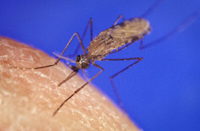New Form of Drug-resistant Malaria Spreads in Cambodia
A malaria that resists the drug artemisinin, which was considered a wonder cure for the disease, has been spreading rapidly in Cambodia, causing concern that it could spread globally.

The drug, which is popular because it is fast-acting, has few side effects and was almost 100 per cent effective, is the first choice for combating the parasitic infection, which kills about a million people each year.
But a study has found that malaria patients in the province of Pailin in western Cambodia are taking far longer than normal to recover, and many are not recovering at all, Telegraph.co.uk reports.
The findings, published in the New England Journal of Medicine on Thursday, are expected to add urgency to efforts to halt the spread of the new strain which experts say could lead to millions more deaths from the disease.
The report comes on the same day researchers in Europe claimed a significant breakthrough, using mosquitoes themselves as a way to a potential malaria vaccine.
In the study conducted at Radboud University in the Netherlands volunteers using the drug chloroquine were given gradual exposure to malaria-infected mosquitoes.
The experiment produced dramatic results, with all 10 subjects in the vaccine group all acquiring immunity to malaria, while five others in a non-vaccinated comparison group did not, Aljazeera.net reports.
With signs of artemisinin-resistance occurring in Cambodia and Thailand, Dr Dondorp says swift action is required to contain the spread.
"Preventing the spread of resistant parasites when they emerge is crucial," he says. "The use of combination therapies is very important for this. I would like to see a ban on artesunate monotherapy except for specific cases," Science Daily reports.
Subscribe to Pravda.Ru Telegram channel, Facebook, RSS!





